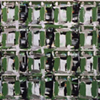Wolfgang Voigt, "Freiland Klaviermusik"
 Earlier this year, Wolfgang Voigt resurrected his long-dormant experimental imprint Profan as a home for his more unusual projects. One such project is his foray into atonal neo-classical piano work, an endeavor that first went public with a 12" EP in 2008. That EP has now been expanded into an identically titled album with rather mixed results, as Voigt's inspired attempt to meld minimal techno and dissonant avant-garde piano music is simultaneously brought to exciting, visceral fruition and flogged exasperatingly to death.
Earlier this year, Wolfgang Voigt resurrected his long-dormant experimental imprint Profan as a home for his more unusual projects. One such project is his foray into atonal neo-classical piano work, an endeavor that first went public with a 12" EP in 2008. That EP has now been expanded into an identically titled album with rather mixed results, as Voigt's inspired attempt to meld minimal techno and dissonant avant-garde piano music is simultaneously brought to exciting, visceral fruition and flogged exasperatingly to death.
Voigt's primary inspiration for Freiland Klaviermusik was Conlon Noncarrow, a composer best known for writing pieces too complicated to be performed by humans (a hurdle that he was able to overcome with the use of player pianos).Voigt, wisely, does not make any attempt to replicate Conlon's Byzantine, disorienting complexity, except for perhaps "Schweres Wasser."In fact, he goes in entirely the opposite direction, composing his pieces from a patchwork of rather brief and simple passages.Nevertheless, there are some distinct similarities, as both artists display a predisposition towards jarring, uneasy listening and mechanized randomness.Wolfgang has a much more minimal and repetitious approach to creating inhuman music though, as the album's 13 pieces are built from essentially two things and nothing more: loops of slow motion bass drum thumps and loops of chromatic piano motifs.There is nothing on Freiland Klaviermusik that seems especially difficult for a pianist to play—though each piece would require several of them playing together to replicate— but the whole album feels very claustrophobic and devoid of human warmth or imprecision.
Voigt, interestingly, does not use the throbbing, dissonant loops as a springboard for anything approaching melody, improvisation, or song craft, nor does he enhance them with any electronics or atmospheric touches—he clearly took thematic purity very seriously.Instead, the pieces derive their power from increasingly dense layering, coldly insistent repetition, and the unwavering pulse of the lonely kick drum.When Wolfgang places the emphasis very strongly on rhythm, which he does quite often, the results can resemble an explosive hybrid of Pierre Boulez and Nick Cave's "From Her To Eternity," particularly on "Zimmer."Notably, only one of the five tracks from the original 12" featured drums, so some definite evolution seems to have occurred since then. When he leaves the bass drum out though, like on "Dunkler Weg," he doesn't fare nearly as well, merely covering well-worn modern classical piano territory without bringing anything new to the table.Then, unfortunately, there are times where he just misses the mark entirely, as on the rather irritating and ham-fisted "Geduld."
Combining murky low-end piano bass lines, slowly thumping pulses, and twelve-tone dissonance was inarguably a fine and gutsy idea (and certainly outside Voigt’s comfort zone), but one great idea is not enough to base an entire album on and Wolfgang definitely stretches it far too thin.After hearing the album a few times, the impact of its power and unexpectedness subsided quite a bit, yielding rapidly diminishing returns and no depth to fill the resultant void.Voigt is probably well aware of that though, given that he chose to self-release the album (and not on Kompakt). Freiland Klaviermusik is an experiment that is well-worth hearing and probably an excellent soundtrack to a Kafkaesque nightmare, but one that is too one-dimensional to be a very engrossing listening experience in a dose of this size.  
Samples:
 



